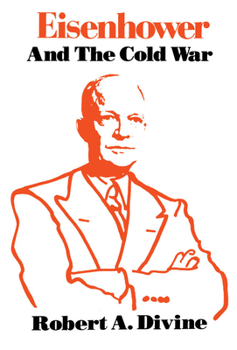Eisenhower and the Cold War
Select Format
Select Condition 
Book Overview
Beloved as a World War II hero, Dwight D. Eisenhower was for many years considerably less appreciated as a president. He was viewed as a lazy and ineffectual statesman, a 'do-nothing' who relied on men like Sherman Adams and John Foster Dulles to conduct national affairs.
Format:Hardcover
Language:English
ISBN:0195028244
ISBN13:9780195028249
Release Date:March 1981
Publisher:Oxford University Press
Length:192 Pages
Weight:0.90 lbs.
Dimensions:0.8" x 0.6" x 0.6"
Customer Reviews
2 ratings
A decidedly pro-Eisenhower read
Published by Thriftbooks.com User , 22 years ago
Robert A. Divine's Eisenhower and the Cold War is a decidedly pro-Eisenhower treatment of American foreign policy during the Republican administration of the 1950s. Divine's Eisenhower is far from the do-nothing Ike whom critics have accused of deferring foreign policy to his subordinates; he is, on the contrary, a rational, calculating, active force exercising full control over decisions involving American security. Blessed with charm, self-confidence even in the midst of crises, and remarkable self-constraint, Divine's Ike appears as an exceptional, perhaps "great" President, unique among post-World War II American Presidents for his broad background in international affairs. Certainly, the author concedes that Eisenhower had certain shortcomings, such as a touchy sensitivity to public criticism and a European-oriented view of the world. Nevertheless, this book dwells heavily on Ike's foreign policy successes: bringing the Korean war to an end within six months of taking office, keeping America out of the crisis over the Suez Canal, refusing to intervene by arms and men in Indochina and Red China, refusing to force a showdown with the Soviets over Berlin, ending the atmospheric explosions of nuclear weapons. All the while, Divine's Eisenhower carefully guides foreign policy on a tough yet moderate course, seeking to decrease Cold War tensions while balancing economic and political imperatives alongside national security requirements.Divine breaks this study up into four sections: Eisenhower as President, Massive Retaliation and Asia, the Middle East, and the Russians. (He admits that this is no full-scale treatment of Ike's foreign policy.) Divine relies on secondary sources to achieve his objective, namely to demonstrate that "Ike was skillful and active in directing American foreign policy" and to explain why Eisenhower failed in the end to meet his peace objectives. The author asserts that Ike desperately wanted to reduce Cold War anxieties and lessen the threat of nuclear war while also keeping defense spending low. Given these constraints, Ike came to rely more on the threat of nuclear strikes than on the dispersion of American combat forces to all the world's hot spots. While Ike's critics have charged him with deferring foreign policy decisionmaking to Secretary of State Dulles and other close aides, Divine shows that Eisenhower pulled all the strings, often choosing to restrain the anti-Communist zeal of Dulles and to disregard the advice of military advisors. The successes he achieved have been neglected or misunderstood, Divine argues, because they were indirect in execution and negative in realization. In other words, the events that Ike was able to prevent (such as a nuclear war) were more important than any positive, sweeping accomplishments. This kind of success, Divine contends, becomes more evident when compared to the pitfalls of Kennedy and Johnson in the 1960s. Basically, Ike's Presidency is seen as a triumph fo
Great book about a great man
Published by Thriftbooks.com User , 27 years ago
A very good, quick read book. Excellent source of information. Reveals many misunderstandings of the Eisenhower administration. If you have an interest in The Cold War, here is the man that but some teeth into US policy (right, wrong, or otherwise)






